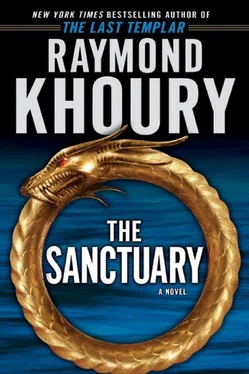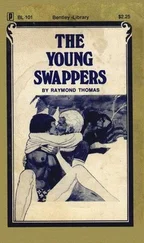A shroud of fatigue descended over him. He slid down to the ground and shriveled up into himself, hoping for sleep to overcome him. He would go to the university in the morning. Find Ramez. Talk to him. And maybe — just maybe — this could all end better for them than it had for his friend Ali.
He didn’t believe it for a second.
Tom Webster put down his cell phone and looked out the floor-to-ceiling window of his office on the Quai des Bergues. It was a crisp early evening in Geneva. The sun was setting behind the craggy peaks of the Alps to the west, reflecting off the lake and bathing its still water with a fiery golden pink glow. The snow hadn’t arrived yet, but it wouldn’t be long now.
The call had left him with a feeling of deep unease.
He replayed the brief conversation in his mind, examining every nuance, going over every beat of what he’d heard. First came the pause once the call was answered. There was a definite hesitance there. Then the garbled words, in a language he was reasonably sure was Arabic. And then the man who’d finally spoken into the phone, claiming to be a colleague of hers. There was something distinctly formal about his tone. His insistence on knowing who was calling Evelyn was a definite signal that this was not the casual pickup of a friend’s phone.
She’s gotten herself sucked into this. Then, a more troubling thought: Is she alright?
The message he’d received from the phone operator at the institute had taken him by surprise. It had been…how long?
Thirty years.
He wondered what had prompted Evelyn’s call, after all that time.
He had his suspicions.
The two events — the call from one of his scouts in Iraq, out of the blue, a little over a week ago, and Evelyn’s call to the Haldane switchboard — had to be connected. That much was obvious. But he hadn’t anticipated any problems going forward. He and his partners always operated pretty much off the radar. They had to be careful, of course — discretion was paramount to their work — but there was no reason to expect any complications.
He tried to rationalize the call and calm his worries, but he couldn’t escape them. This didn’t bode well. A long time ago he had learned to trust his instincts, and right now they were clamoring for attention. He needed to know what was really going on. Then he’d need to call the others. Let them know what was happening. And come to a unanimous agreement — as the three of them always did — as to how to handle the situation.
He checked his watch. Beirut was two hours ahead. The time difference meant that he wouldn’t be able to get any answers for a few hours. He’d need to stay up and make some calls just before daybreak. Which he didn’t mind.
As with the others before him, this was what he had devoted his whole life to.
And if his instincts were right, it now involved Evelyn.
Again.
He exhaled deeply and turned to his desk. The codex was lying there. He’d taken it out of the safe earlier. It just sat there, innocently. He stared at it, then picked it up and shook his head faintly.
Innocent.
Hardly.
The book had entangled him, and others, in its tantalizing web for centuries. It was irresistible, and for good reason. It was worthy.
He shrugged, opened it to its first page, and thought back to how it had all begun.
Tomar, Portugal — August 1705
Sebastian felt the chill of dampness seep out from the walls and smother his bones with its deathly embrace as he followed the guard down the narrow, winding steps.
He kept his eyes low, away from the flames of the guard’s torch. In the swaying, golden light, he noticed that a groove had been worn into the center of the treads. It had thrown him at first, before he’d realized it had been carved into the stone by the repeated passage of shackles.
Many prisoners had languished here, in Tomar. And many more would.
He followed the guard down a long, narrow passageway. Rough, wooden doors with forbidding steel locks lined it on either side. The guard finally stopped outside one of them. He fumbled with a large ring of keys and unlocked it. It shuddered on its hinges as it swung outwards. The opening was like the mouth of a cave, a doorway to a tenebrous abyss. Sebastian looked at the guard. The sweating man nodded with unsettling disinterest. Sebastian steeled himself, pulled a torch down from its wall mount, lit it against the guard’s, and stepped inside.
Despite the hellish surroundings, the silhouetted figure, huddled against a dark corner, was instantly familiar. Sebastian froze at the sight as a feeling of infinite sadness descended on him.
“It’s alright,” the old man told him. “Come.”
Sebastian couldn’t move. His feet felt as if they were bolted to the cold stone floor.
“Please,” the old man whispered again, his voice coarse and dry. “Come. Sit with me.”
Sebastian took a hesitant step closer, then another, his eyes unwilling to accept the heart-wrenching sight facing him.
The battered, demolished man raised a chained, twisted arm and beckoned him over. Two of the fingers, Sebastian noticed, weren’t moving at all. The thumb was gone altogether.
Isaac Montalto was a good man. He’d been a close friend of Sebastian’s father’s. Both were learned men, teachers and tutors to the elite, and had spent years working together in the great city of Lisbon, studying and translating Arabic and Greek texts that were long forgotten. A small invader had put an end to that. The virus, an unremarkable flu by today’s standards, had ravaged the city mercilessly that winter, taking Sebastian’s family with it. The baby boy had survived — his father had acted swiftly and placed him in the care of his friend Isaac, at his home in nearby Tomar, when the first signs of the illness had appeared in the family. Isaac and his wife had cared for the baby as best they could those first few weeks, before Isaac’s wife had gotten sick herself. The old man had no choice but to put Sebastian into the care of the friars at the monastery of Tomar. Isaac’s wife also hadn’t made it through that winter, but Isaac and Sebastian had survived.
Being a widower, Isaac hadn’t been able to keep the baby with him. The friars at the monastery would raise him, along with other orphans. But Isaac was never far away. He was a friend and a mentor, keeping a watchful eye as the baby grew into a boy and into the young man he was now. He’d waved him off with a heavy heart when the boy had been selected to pursue his duty to God at the cloisters of the Cathedral of Lisbon. But that was three long years ago. And now he was here, a victim of the Inquisition, a pale, battered reflection of the man he used to be.
“Isaac,” Sebastian said, his voice filled with sorrow and remorse. “My God…”
“Yes,” Isaac whispered with a pained chortle, his eyes narrowing with the pain in his chest. “Your God…” He swallowed heavily and nodded to himself. “He must be very proud. To see to what great lengths his servants are willing to go to ensure his word is followed.”
“I’m sure he never intended anything like this,” Sebastian offered.
Somehow, a hint of a smile found its way into the old man’s eyes. “Careful, my dear boy,” Isaac cautioned him. “Such words could land you in the next cell.”
The madness of the Inquisition had infected the Iberian Peninsula for over two hundred years. As with its more famous analogue in Spain, its main thrust in Portugal was to root out converts from other faiths — Muslims and Jews — who, despite claiming to have embraced the Catholic faith, were still secretly following their original beliefs.
Читать дальше












